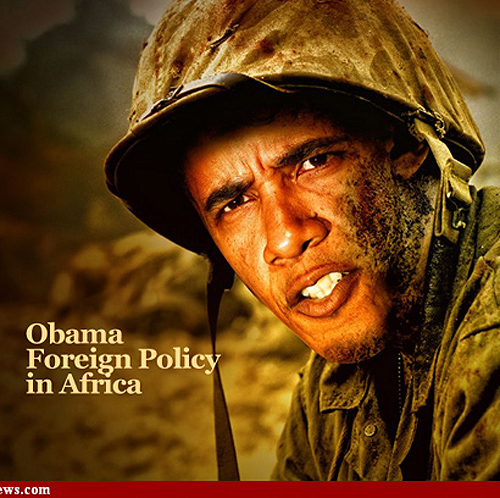
Obama’s massive military involvement in Africa is mostly covert, so not readily understood. But the policy is public if difficult to ferret out, and Ralph Nader said yesterday on Iowa Public Radio that Obama is far more militant than George Bush, who got us mired in two major wars.
Nader’s right. But Nader neglects to explain that Obama’s militancy is predominantly covert. Using drones, very secret special forces that come and go quickly, and massive support of African proxy armies, Obama has exceeded American military involvement in Africa under George Bush almost exponentially. But not in soldiers. So Americans don’t feel it, and mostly they don’t know about it.
Africom, the Pentagon command for Africa, now has more personnel and overall resources than all of USAid for Africa. The command manipulates deployed drones that have assassinated a dozen African militants and been critical to successful African military operations in Somalia, Uganda, the DRC and the Central African Republic.
That is not, of course, the be-all and end-all of American foreign policy in Africa. There has been continued assistance throughout the continent on a wide range of issues from clean water to malaria eradication; the Obama administration has been particularly supportive of African initiatives in the UN and World Court; and on highly political issues (several regarding Rwanda) the Obama Administration has come down swiftly and correctly on the sides that we progressives champion.
But the bottom line is that Obama looks much more like a general than a philanthropist to Africans, today. It is unlikely he would be nominated today for the Nobel Peace Prize.
I remain certain terrorism cannot be eliminated strictly militarily. That results in two options: (a) don’t try to eliminate global terror, just do the best possible and learn to live with what remains; or (b) simultaneously work towards eliminating the cause of terrorism.
That [b] has gained the euphemism of “nation building” starting as early as the Vietnam War, and it remains hard to define, very open-ended nonmilitary support that is often squandered or misplaced. But there is no question Obama believes in the policy for Africa, despite the emphasis on militarism.
So as the veteran African diplomat John Norris pointed out in Foreign Policy earlier this year, “this president’s approach to Africa look a great deal like business as usual.”
It’s hard to fault a leader who had to dedicate most of his time to staving the collapse of the entire global economic order for being uncreative with new African development policies. But it’s not hard to critique his aggressive militant approach to Africa’s terrorists. That’s not “business as usual.” It is a considerable ratcheting up of war in Africa.
But fatefully or coincidentally “nation building” in Africa is proceeding at a rapid pace as well, albeit with little direct American support. The implementation of a new constitution in Kenya, a recharged South African political debate about basic social and commercial policies, glimmers of constitutional change in Tanzania and Malawi, might all be that is necessary to balance Obama’s militarism.
And it puts us progressives and peaceniks in a compromised position. Terrorism might indeed be on the wane in Africa because of Obama’s increased militarism, but the policies are not the ones we would have advocated in the beginning and the question of their shelf life remains dubious.
Is Obama an African war monger? Yes. But global peace maker, too? That is the crux of today’s African foreign policy debate.
Personally, while I disdain military intervention (and was deeply opposed to our involvement in Iraq and Libya), right now I would wholeheartedly support any military intervention, covert or overt, to rid Northern Mali of its fanatical hordes, though would hope such would be accompanied by concrete, serious efforts toward addressing the quality of life and aspirations of people there, so they do not have cause to be lured to Salafism and worse. For the rest of the Continent, I do feel a lot of what you call the “militant approach” is dictated by pressure from the John McCains and other zealots on the Republican side. Hopefully, in his 2nd Term, “Ndugu” will feel freer to swing the balance more to the constructive, consequently not needing to rely as much on the military.
With reference to this article, please see my “letter to Obama” about the crisis in Mali: http://www.fromhere2timbuktu.com/blog/entry/general/a-letter-to-barak-obama-on-the-mali-crisis
I doubt it, Jim. Our international relations has suffered under (another) President who has not served overseas or come to understand the true nature of human hardship. To understand that, requires spending time in the midst of famine, bloody riots, lack of modern medicine and technology, and/or with people living ‘on the edge’ 100 miles past the end of the nearest road. Without that, decisions by many politicians are so often made with a casual indifference to the human costs of the results. Perhaps someday a Peace Corps grad, serviceperson with humanitarian MOS, or someone with a public health background will run for highest office…although I must say WHO WOULD WANT TO after witnessing this past year’s non-substantive character attacks on what I perceive to be two fundamentally good men who differ in their substantive proposals for the future?
Let’s leave politics out of the discussion….I don’t believe it is appropriate.
You sound like a very dangerous propagandist! You once had good travel info. I can tell where you now stand!
Obama is far more diplomatic than the neocons who are advising Romney. these are the same people who both pushed and mismanaged the war with Iraq. They will hand over our foreign policy to Israel.